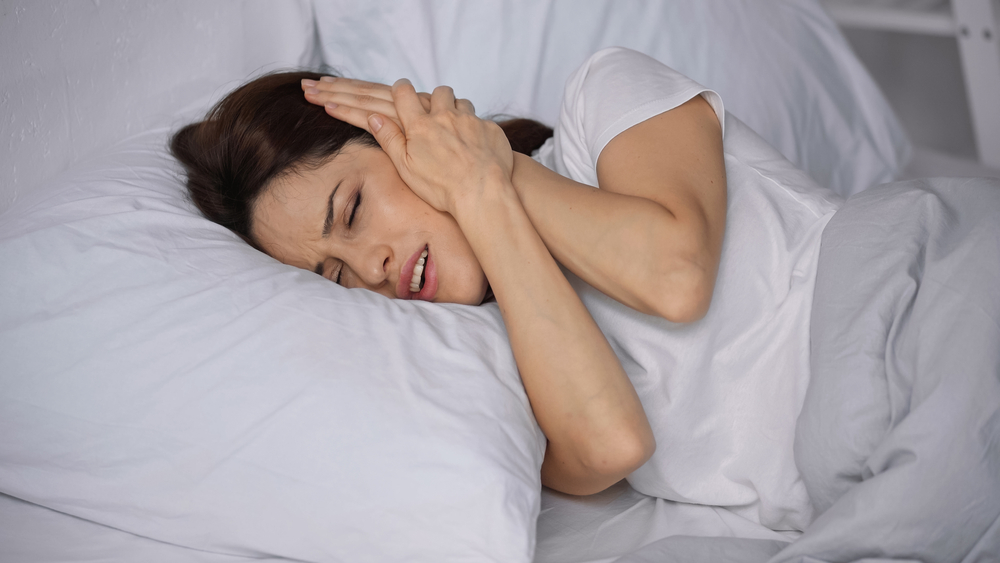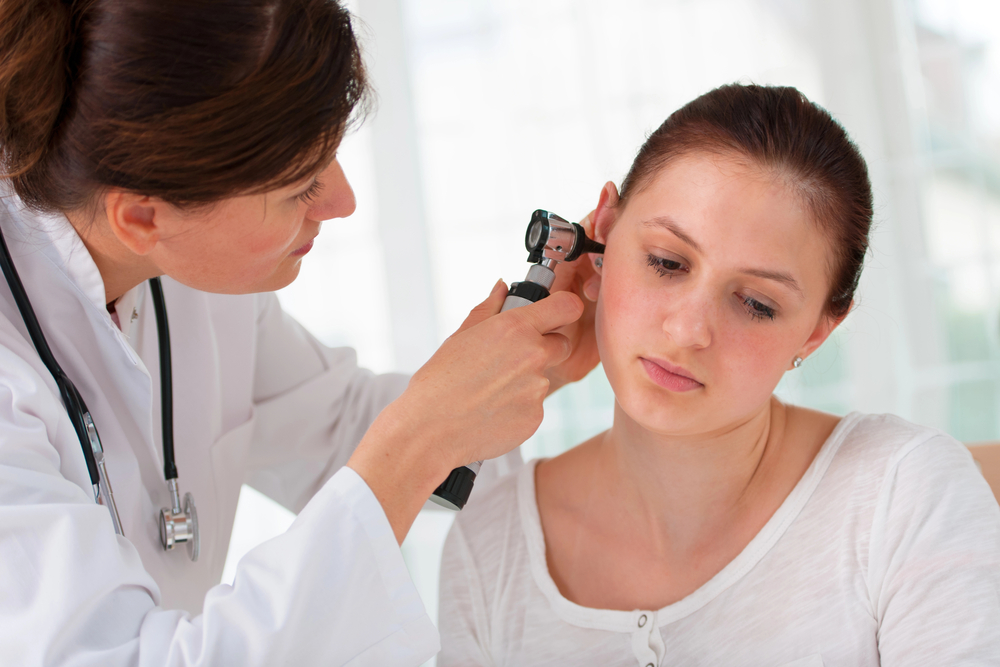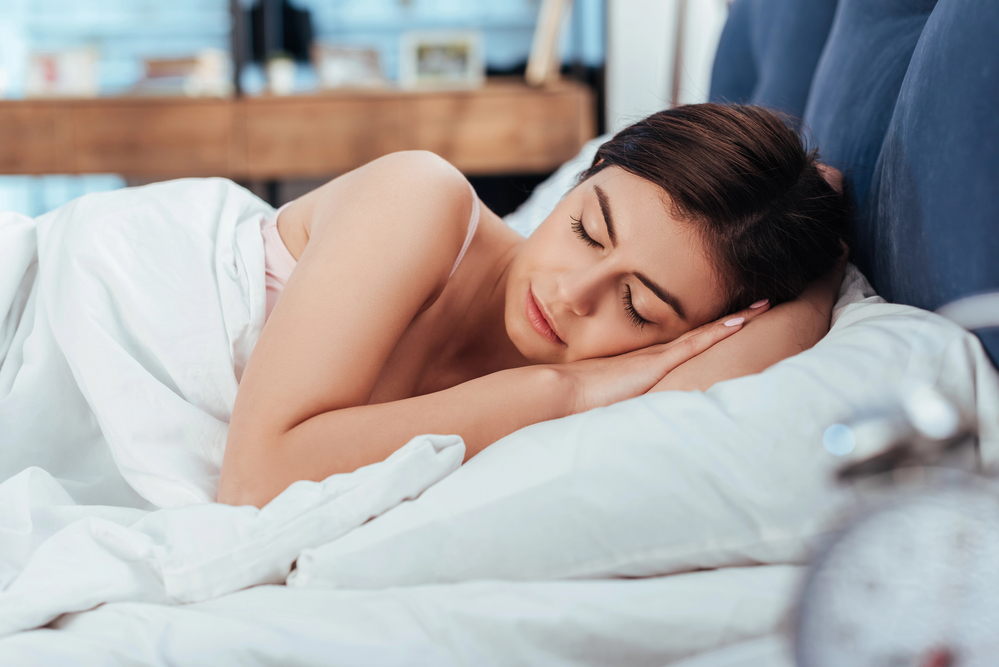How To Sleep With Ear Infection

Battling ear infections can be a really painful experience, especially when trying to get some sleep. The unbearable pain and discomfort often intensify at night when you lie down, making it quite hard to get the sleep you need to feel better. Fortunately, understanding how to change your sleep habits and lifestyle can make a big difference.
In this in-depth guide, we'll closely examine several vital areas, including the effects of an ear infection on sleep, the best sleeping positions for optimizing sleep, and some of the most effective remedies to alleviate the pain. Read on to learn how you can overcome the numerous challenges of sleeping with infected ears and wake up feeling rejuvenated and on the road to quick recovery.
Causes, Symptoms & Treatments of Ear Infections

Generally, ear infections start when contaminated fluid gets trapped inside the ear and becomes an infection over time. The trapped germs can cause infection and inflammation, leading to pain in the ear. Aside from causing severe pain, ear infection can lead to yellowish discharge, redness, headache, and hearing loss. In children, ear infection symptoms can also include tugging at the ear, fussiness and crying, loss of appetite, and loss of balance.
While most ear infections usually go away after a few days, numerous at-home remedies can help relieve some of the ear infection symptoms. For instance, taking pain relievers like ibuprofen or acetaminophen can relieve pain and give you a good night's sleep. Some patients may even find that they benefit more from alternating acetaminophen and ibuprofen doses to take advantage of their pain-relieving effects.
If you have an ongoing health condition or are taking other drugs for other symptoms associated with ear infection, consult an ENT specialist for advice on which medication is best. Likewise, kids under the age of 2 shouldn't use over-the-counter drugs, as they've been advised by their physician.
The Impact of Ear Infections on Your Sleep
An ear infection can negatively affect your sleep due to the pain it causes. Pain is the primary symptom of ear infections, which can intensify at night when lying down and when applying pressure on the infected part. This can make it quite hard to find a comfortable sleep position.
If you find a suitable position for your condition, the frequent throbbing sensation from the ear infection can cause frequent awakenings, disrupting your sleep pattern. Since this can keep you up deep into the night, you'll end up waking up tired and feeling lethargic all day long,
How to Prepare for Bed if You Have Ear Infections
Preparing for bed with an aching ear involves creating a comfortable sleep environment and implementing strategies that can help reduce pain and discomfort. Below are useful tips to help you get the restful sleep you deserve.
Create a Serene Bedroom Atmosphere
To sleep comfortably with an outer or middle ear infection, also known as acute otitis media, you must ensure that your sleep environment is conducive enough for a good night's sleep. First things first, you want to start by decluttering your room, as a tidy and organized room helps keep the mind relaxed and ready for sleep. It will also be wise to reduce light exposure and keep your room as dark as possible. An eye mask and blackout curtains really come in handy in such situations.
We also recommend optimizing room temperature for better sleep. While the perfect temperature for sleep is about 65 degrees Fahrenheit, feel free to adjust your thermostat according to your comfort needs. Other things that can help create an environment that promotes restorative sleep include minimizing electronic distractions and using essential oils to wind down and relax.
Choosing the Ideal Mattress & Pillow
When suffering from an ear canal infection, the best mattress for your condition can provide the necessary comfort and support, making you relax and potentially sleep better. An old and unreliable mattress can distract from your sleep in many ways. If your current mattress is noisy, has lost its standard shape, and causes aches and pains, it may be time to invest in a new mattress.
An adjustable mattress can be very beneficial in such situations, as it allows patients to elevate their heads, which can help with painful pressure relief in the middle ear. A firmer mattress with quality materials can also deliver better support and minimize allergens that could worsen your condition. High-end organic mattresses from PlushBeds can relieve ear pain and help improve your sleep quality. The PlushBeds Botanical Bliss is our favorite pick as it is hypoallergenic, breathable, and provides adjustable height, which you can customize to your comfort level.
We also recommend investing in a quality pillow to relieve pressure on the affected area and alleviate pain and discomfort. Hypoallergenic pillows with breathable fabric, adjustable height, and ear hole design can prevent allergens that may aggravate your ear infection, keep the surface calm, and reduce pressure on your middle ear, which is helpful for patients with pain.
Note that these are only general suggestions, and opting for a product that meets your unique preferences and supports your overall well-being is crucial. If you have a specific health condition, consult your physician for additional guidance tailored to your sleep needs.
Pre-sleep Routine to Ease Ear Pain and Discomfort
A bedtime routine can offer the best foundation for sufficient sleep for patients who don't get enough rest regularly. A bedtime routine is basically a set of activities done in the same order each night, 30 to 60 minutes before bedtime. Your routine can be tailored to perfectly fit your needs and sleeping environment.
Some of the best pre-sleep routines to ease discomfort when dealing with middle ear infection include relaxing activities like deep breathing and light stretching to calm the body and mind before sleep. Music has also proven to be a powerful relaxation tool for patients with pain. The genre isn't that important as long as what you're listening to calms you.
Best Sleeping Positions for Ear Infections
Most patients may have difficulty falling or staying asleep when one or both ears are infected. So, if you're experiencing ear pain after an infection, you should consider talking to an ENT specialist about pain relief to help you sleep comfortably. Additionally, temporary adjustments to sleep positions may help minimize discomfort from sleeping with an ear infection.
The secret here is to let the infected region breathe. The following positions should help you get rid of your ear infection quickly, optimize your comfort, and get the pain-free sleep experience you need.
Side Sleeping on the Unaffected Part

You may have an infection in one or both ears, depending on the cause of the illness. If only one ear is affected, you'll feel more comfortable sleeping on the unaffected part with the infected side facing up. This will allow your ear to stay elevated, drain, and heal instead of trapping it against the pillow under your head's weight. Plus, side sleeping may help ear drops get into the infected middle ear if prescribed by your physician.
Elevated Back Sleeping
If both ears are infected, then sleeping on your back may be the most comfortable sleep position until your ears heal. Remember, elevation plays a pivotal role in draining the fluid out of your ear. So, we recommend propping yourself on multiple pillows to elevate your infected ear while being cautious about maintaining a proper pillow position. If you feel a lot of pressure in your ears, you might also consider sleeping upright.
Aside from easing pressure and pain in the middle ear, sleeping while sitting up will allow fluid in the infected ear to drain more efficiently, which further helps in the healing process. Here, you'll want to sleep in a reclining sofa, or better yet invest in an adjustable base, such as the Amerisleep Adjustable Bed+, which allows you to customize your sleep surface for the perfect neck and spinal alignment.
Home Remedies for Ear Infections
Having that throbbing sensation in your ear can be uncomfortable and irritating. Fortunately, numerous home remedies for ear infections can help patients relieve pain and get them back on track.
Warm Compress
A warm compress or a heating pad can significantly help minimize ear pain. All you need to do is soak a clean washcloth in warm water, squeeze it to remove excess water, and hold it against the affected ear for about 20 minutes. If you prefer things a little cooler, you can use the same procedure to apply a cold compress on your ear. While heat encourages the ear muscles to relax and allows fluids to flow better, ice can dull the pain and help reduce inflammation. Try alternating between a warm and a cold compress every 20 to 30 minutes for the best results.
Saltwater Gargle
Gargling salt water is another effective way of reducing inflammation and relieving ear pain. Of course, this doesn't mean you put salty water directly in your ear. Instead, add a half tablespoon of salt to a cup of warm water and then gargle it for about 2 minutes. This can significantly help reduce ear infection symptoms, especially if your condition is linked to a swollen throat.
Drying Ear Drops
If you're suffering from an outer ear infection, also known as a swimmer's ear, putting fluid-drying ear drops in your ear might come in handy. Placing 2 to 3 drops of hydrogen peroxide can also help clean dirt and fluid buildup from your ear. You can purchase over-the-counter ear drops online or at physical retail stores. It's worth noting that using eardrops isn't appropriate for patients with ear tubes. You should also not use them if there's discharge coming from the ear. So, before buying ear drops or hydrogen peroxide for your ear infection, check with your ENT specialist to ensure they suit your condition.
Neck Exercises
When suffering from an ear infection, your ear muscles can swell, adding more pressure and pain to your ears. To help relieve the tense muscles around your ear canal and ease the pressure, you can give your neck some workout before bedtime. These tips should get you started:
- Gently open your mouth to a level that it feels comfortable and hold for a few seconds
- Shrugging your shoulders up and down
- Rotate your head in slow circles
Your physician can guide you accordingly so that you don't end up making your condition worse. So, reach out to them anytime you feel pain when performing these exercises or when in doubt about a certain procedure.
Try Natural Remedies
Natural remedies like basil, diluted garlic, and tea tree oil can assist the body in fighting off ear infections and other illnesses. Always consult your healthcare provider before putting anything in your infected ear to avoid causing further damage.
Rest
Sleeping strengthens the immune system, helping the body fight off infections. So make sure you get at least 8 hours of sleep each night. Just ensure you keep hair and blankets away from your ear and don't sleep on the infected side. The airflow around your ear is vital in keeping it dry and allowing it to heal faster.
Other Tips for Better Sleep
In addition to taking pain relievers and creating a conducive sleep environment, there are a few more ear-friendly tips that can help you recover much faster.
Improve Air Supply Around Your Affected Ear
As mentioned earlier, keeping blankets, sheets, and other sleep accessories away from your infected ear promotes maximum airflow around the aching region, allowing you to recover better and faster. This is especially beneficial for those suffering from an outer ear infection, commonly known as swimmer's ear. We also recommend keeping your ears cool, sweat-free, and elevated for a smooth, pain-free transition to slumberland.
Use White Noise or Soothing Sounds
Using white noise and soothing sounds can be really beneficial, especially if you're in pain. White noise, for instance, works by masking disruptive environmental noises that can keep you from falling asleep at night or waking you up from sleep. Pink noise, such as rain or waves, has also been shown to improve the quality of sleep. These sounds can put your body and mind in a relaxed state, making it easier to sleep despite the pain and discomfort. Their steady hum offers a perfect distraction from ear pain, meaning you'll focus less on discomfort. Always keep your volume at comfortable levels to prevent any potential harm to your ears.
Relaxation Techniques & Mindfulness Practices
Incorporating mindfulness practices and relaxation techniques into your sleep routine can help you sleep better. Some of the most widely recommended practices include:
- Progressive muscle relaxation - Tensing each muscle group of your body and then relaxing them can minimize physical tension and encourage relaxation.
- Taking a warm shower - Taking a warm shower 30 to 60 minutes before bed can lower your internal temperature afterward, which signals it's time to sleep.
- Visualization - Imagining a peaceful scene engages your mind, distracting it from the pain and discomfort that might keep you awake.
- Mindful movement - Engaging in gentle activities like yoga can assist you in focusing on your body movements, promoting a calm state.
- Mindful journaling - Writing down your thoughts shifts your mindset and helps you clear your mind before bedtime.
By including these activities in your sleep routine, you can unwind easily and prepare for a good night's sleep. That said, find the best techniques for your needs and make them a regular part of your sleep hygiene.
What Can Happen if an Ear Infection Isn't Treated?
Left untreated, a severe ear infection can lead to hearing problems and several other complications. For starters, temporary hearing loss is possible if the condition is severe. Permanent loss can also occur if the infection keeps coming back without being attended to. Plus, untreated middle ear infections can cause the bacteria to spread to nearby body parts. You put yourself at high risk of getting meningitis, mastoiditis, or even eardrum damage.
The ear infection can also affect your inner ear, leading to a ruptured eardrum, balance problems, and dizziness. In children, hearing loss from untreated infections can cause speech or language development delays. That said, seeking medical attention promptly is crucial to keep these complications at bay. If you need ear infection help, consult your doctor for appropriate diagnosis and treatment.
When to See a Doctor
As you can see, sleeping with an ear infection isn't as challenging as it seems. With the right strategies and sleep adjustments, you can easily find pain relief and get the restorative sleep you need. Remember to establish a consistent pre-sleep routine to prepare your body for sleep and to effectively manage ear pain with the right drugs, as your doctor advises. Also, seek medical attention if the pain worsens at night or if the ear infection seems to escalate and the symptoms remain after finishing the drugs. Your ENT specialist can prescribe antibiotics or assess potential complications to ensure a full and speedy recovery.
Gabe is the newest member of The Sleep Shop team. If you like the design of The Sleep Shop, give Gabe a thumbs up. He’s a digital marketing and design guru and the brains behind the design and SEO of The Sleep Shop. He also won’t say no to testing a ton of mattresses either, and helps on almost every mattress review.
Learn More About Gabe
